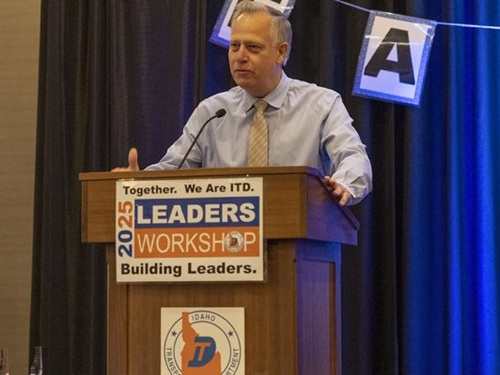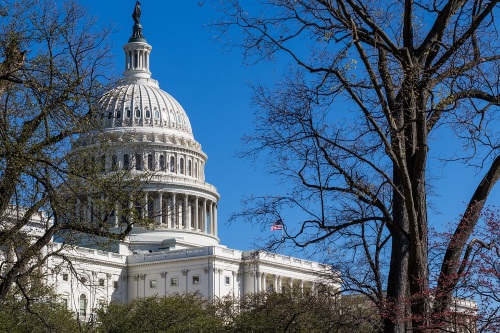Appearing before the House of Representatives Committee on Appropriations Transportation, Housing and Urban Development and Related Agencies or THUD Appropriations Subcommittee on April 10, U.S. Transportation Secretary Elaine Chao reiterated the Trump administration’s positions on infrastructure investment within its Fiscal Year 2020 budget request – a position she staked out in a hearing before the Senate’s THUD Appropriations Subcommittee on March 27.
[Photo of U.S. Capitol via Pixabay.]
“The president’s budget requests a total of $84 billion to support transportation programs in FY 2020,” Sec. Chao said in her written remarks at the Appropriations Subcommittee hearing. “About 75 percent of this request fully funds surface transportation for the ‘fifth’ and final year of the Fixing America’s Surface Transportation or FAST Act and the Federal Aviation Administration’s authorized funding levels for the Grants-in-Aid for Airports program. These programs support infrastructure improvements that are critical to maintaining dependable transportation systems that support our growing economy.”

She said the remaining 25 percent of the FY 2020 budget request – some $21.4 billion – will fund what Sec. Chao described as “several high priority investments and important reforms” that will “strengthen our programs while making them more efficient.”
She noted, however, that this portion of the FY 2020 budget proposal is a $5.1 billion reduction from FY 2019 enacted levels, because of what Sec. Chao called “additional infrastructure investments” the Congress committed to in the two-year government-wide “discretionary funding caps deal” made as part of omnibus spending legislation passed in March 2018.
“When you deduct those temporary increases, this request provides a robust level for many of the department’s programs and tracks very closely to the FY 2019 enacted appropriations,” she said.
However, Rep. Nita Lowey, D-NY, chairwoman of the Appropriations Committee, took issue with FAA, National Highway Traffic Safety Administration, and Federal Railroad Administration cuts within the president’s budget proposal.

“In a speech less than two weeks ago, you said the priority of the USDOT is first, safety; second, rebuilding and refurbishing our country’s infrastructure; and third preparing for the future,” Rep. Lowey said in her opening statement. “But if a budget reflects values, it seems the Trump administration does not unfortunately share these priorities. While the USDOT primary focus is safety … these decreases, in my judgement, seriously jeopardize safety. And in terms of rebuilding and refurbishing infrastructure, it falls short by neglecting to include even one cent for the Gateway project. The administration is neglecting upgrades to its own assets.”
The $30 billion Gateway project refers to the long-delayed reconstruction of the Northeastern rail corridor used by Amtrak and includes railroad bridges, train stations, and tunnels.
She added that “when our current infrastructure is in such desperate need of repair, preparing for the future must mean ensuring continuity of service and the sustained safety of infrastructure right now. Frankly, I am unimpressed by your budget request.”

Many questions during the two-and-a-half-hour long hearing directed at Sec. Chao dealt with the two Boeing 737 Max airline crashes, the FAA’s role in certifying those planes for operation, and how the software systems involved potentially impact the development of autonomous vehicles.
Rep. David Price, D-NC, chair of the House’s THUD Appropriations Subcommittee, specifically highlighted that issue near the end of his opening remarks.
“I believe the Boeing incident touches on larger questions about whether USDOT is fully prepared to oversee and regulate increasingly complex technologies in the ‘age of automation,’” he said. “Whether it’s autonomous vehicles, ships, or aviation systems, it’s clear USDOT must undertake a massive effort to recruit and retain staff who are qualified and knowledgeable about automation and human behavior.”

Rep. Price added that “these technologies hold enormous potential to increase efficiency and improve safety. But as we’ve seen recently, a single accident can cause terrible loss of life and result in a crisis of confidence. If the [USDOT] lacks the expertise to safely regulate these emerging technologies, the results will be catastrophic not only for consumers and passengers but also for the businesses and industries that drive innovation.”
Another major issue discussed at hearing centered around a good number also revolved around infrastructure needs.
In response to a question regarding highway project resiliency, Sec. Chao said the Federal Highway Administration is working with states and metropolitan planning organizations to plan for “extreme events” by “assessing infrastructure vulnerability and also incorporate resiliency in all phases of transportation planning and design.”

Rep. Price emphasized that he believes that “collaborative approach” between USDOT and both state and local governments is important in terms of improving infrastructure resiliency.
“Each year, USDOT awards tens of billions in competitive and formula grants,” he said. “Whether it’s increasingly severe flooding, hurricanes, or wildfires, we need to take an ‘all-hazards’ approach and ensure our federal dollars support projects that can withstand future threats.”
Sec. Chao also expressed confidence that “infrastructure is one area where we really should have consensus. And [any] package, proposal, or initiative of addressing our nation’s infrastructure should really be bipartisan.”
She also reiterated that the “good news is, everything is on the table” in terms of the administration’s willingness to explore transportation funding options.
 Top Stories
Top Stories
AASHTO Details Annual Meeting Knowledge Sessions
October 24, 2025 Top Stories
Top Stories

